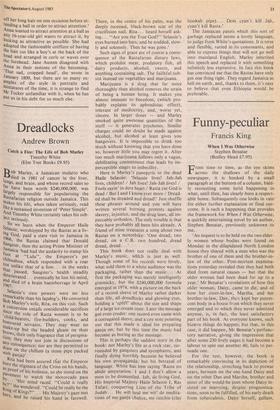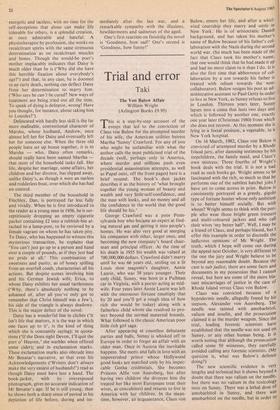Funny-peculiar
Francis King
When 1 Was Otherwise Stephen Benatar (Bodley Head £7.95)
From time to time, as the eye skims across the shallows of the daily newspaper, it is hooked by a small paragraph at the bottom of a column, bald- ly recounting some lurid happening in what, until then, has clearly been a respect- able home. Subsequently one looks in vain for either further explanation or final out- come. It is such a happening that provides the framework for When I Was Otherwise, a quirkily entertaining novel by an author, Stephen Benatar, previously unknown to me.
°An inquest is to be held on the two elder- ly women whose bodies were found on Monday in the dilapidated North London house they shared with a man who was the brother of one of them and the brother-in- law of the other. Post-mortem examina- tions yesterday revealed that they had both died from natural causes — but that the older woman had been dead for up to a year.' Mr Benatar's revelations of how this older woman, Daisy, came to die, and of how her sister-in-law, Marsha, and her brother-in-law, Dan, then kept her putres- cent body in a house from which they never emerged and to which they never admitted anyone, is, in fact, the least satisfactory part of his book. As everyone knows, such bizarre things do happen; but that, in this case, it did happen, Mr Benatar's perfunc- tory narrative, giving the impression that after some 230 lively pages it had become a labour to spin out another 40, fails to per- suade one.
For the rest, however, the book is remarkably convincing in its depiction of the relationship, stretching back to prewar years, between on the one hand Daisy and on the other Dan and Marsha, brother and sister of the would-be poet whom Daisy in- sisted on marrying, despite prognostica- tions, soon to be fulfilled, of his early death from tuberculosis. Daisy herself, gallant,
energetic and tactless, with no time for the self-deceptions that alone can make life tolerable for others, is a splendid creation, at once admirable and hateful. A physiotherapist by profession, she works on recalcitrant spirits with the same strenuous determination as on recalcitrant muscles and bones, Though the would-be poet's mother implacably indicates that Daisy is much older than he is ('Why did she have this horrible fixation about everybody's age?') and that, in any case, he is doomed to an early death, nothing can deflect Daisy from her determination to marry him. ('Who says he can't be cured? New ways of treatment are being tried out all the time. To speak of dying is defeatist, wrong! Have you thought, for instance, about taking him to Lourdes?').
Delineated with hardly less skill is the far more malleable, conventional character of Marsha, whose husband, Andrew, once almost left her for Daisy and eventually left her for someone else. When the three old people have set up house together, it is to Marsha — who, Daisy often remarks, should really have been named Martha — that most of the household tasks fall. Her life, despite her marriage, some affairs, her children and her divorce, has slipped away, unlike Daisy's, as though it were an oarless and rudderless boat, over which she has had no control.
The third member of the household in Finchley, Dan, is portrayed far less fully and vividly. When he is first introduced to the reader as a young man in 1936, he is sur- reptitiously dropping an empty cigarette packet containing £2 into a• rubbish-bin at- tached to a lamp-post, to be retrieved by a female vagrant on whom he has taken pity. To Daisy, who has happened to witness this mysterious transaction, he explains that 'You can't just go up to a person and hand over a couple of pounds, as if they just had no pride at all.' This combination of sweetness and purity, as of honey spilling from an overfull comb, characterises all his actions. Btrt despite scenes involving him and his German Jewish wife, Erica, to whom Daisy exhibits her usual tactlessness ('Why, there's absolutely nothing to be ashamed of, after all you've only got to remember that Christ himself was a Jew'), his side of the triangle is always shadowy. This is the major defect of the novel.
Daisy has a wonderful line in cliches ('It isn't life that matters, it is the way in which one faces up to it', is the kind of thing which she is constantly saying); in quota- tions Cif the Dons sight Devon, I'll quit the port o' Heaven,' she warbles when offered some cider); and in exclamation marks. These exclamation marks also obtrude into Mr Benatar's narrative, so that even his Acknowledgements ('Writers don't always make the very easiest of husbands!') read as though Daisy must have lent a hand. The book-jacket, with its overexposed photograph, gives no accurate indication of Mr Benatar's age. If he is still young, then he shows both a sharp sense of period in his depiction of life before, during and im-
mediately after the last war, and a remarkable sympathy with the illusions, bewilderments and sadnesses of the aged.
One's first reaction on finishing the novel is 'Goodness, how sad!' One's second is 'Goodness, how funny!'







































 Previous page
Previous page